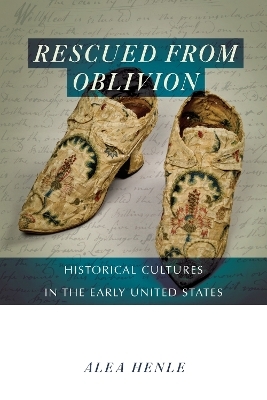
Rescued from Oblivion
Historical Cultures in the Early United States
Seiten
2020
University of Massachusetts Press (Verlag)
978-1-62534-499-1 (ISBN)
University of Massachusetts Press (Verlag)
978-1-62534-499-1 (ISBN)
With in-depth research and an expansive scope, Rescued from Oblivion offers a vital account of the formation of historical culture and consciousness in the early United States, re-centring in the record groups long marginalized from the national memory.
In 1791, a group of elite Bostonian men established the first historical society in the nation. Within sixty years, the number of local history organizations had increased exponentially, with states and territories from Maine to Louisiana and Georgia to Minnesota boasting collections of their own.
With in-depth research and an expansive scope, Rescued from Oblivion offers a vital account of the formation of historical culture and consciousness in the early United States, re-centering in the record groups long marginalized from the national memory. As Alea Henle demonstrates, these societies laid the groundwork for professional practices that are still embraced today: collection policies, distinctions between preservation of textual and nontextual artifacts, publication programs, historical rituals and commemorations, reconciliation of scholarly and popular approaches, and more. At the same time, officers of these early societies faced challenges to their historical authority from communities interested in preserving a broader range of materials and documenting more inclusive histories, including fellow members, popular historians, white women, and peoples of color.
In 1791, a group of elite Bostonian men established the first historical society in the nation. Within sixty years, the number of local history organizations had increased exponentially, with states and territories from Maine to Louisiana and Georgia to Minnesota boasting collections of their own.
With in-depth research and an expansive scope, Rescued from Oblivion offers a vital account of the formation of historical culture and consciousness in the early United States, re-centering in the record groups long marginalized from the national memory. As Alea Henle demonstrates, these societies laid the groundwork for professional practices that are still embraced today: collection policies, distinctions between preservation of textual and nontextual artifacts, publication programs, historical rituals and commemorations, reconciliation of scholarly and popular approaches, and more. At the same time, officers of these early societies faced challenges to their historical authority from communities interested in preserving a broader range of materials and documenting more inclusive histories, including fellow members, popular historians, white women, and peoples of color.
Alea Henle is associate librarian and head of the access and borrow department at Miami University Libraries.
Prologue
1. ""The lumber yard of history"": The Organization, Progress, Successes, and Failures of Historical Societies
2. ""So divided and subdivided"": Preserving Local Histories and Government Records
3. Defining History: Historical Society Collection Priorities
4. ""Disjointed fragments"": Materials as History v. Materials For History
5. ""Less repulsive to the general reader"": Popular History in Historical Societies
6. ""[A]n oblivious society"": Inclusion, Exclusion, and Omission in Historical Society Collections Appendices
| Erscheinungsdatum | 01.09.2020 |
|---|---|
| Reihe/Serie | Public History in Historical Perspective |
| Zusatzinfo | 9 black & white photos, 5 tables |
| Verlagsort | Massachusetts |
| Sprache | englisch |
| Maße | 152 x 229 mm |
| Gewicht | 420 g |
| Themenwelt | Kunst / Musik / Theater ► Allgemeines / Lexika |
| Geisteswissenschaften ► Geschichte ► Hilfswissenschaften | |
| Geisteswissenschaften ► Geschichte ► Regional- / Ländergeschichte | |
| ISBN-10 | 1-62534-499-6 / 1625344996 |
| ISBN-13 | 978-1-62534-499-1 / 9781625344991 |
| Zustand | Neuware |
| Haben Sie eine Frage zum Produkt? |
Mehr entdecken
aus dem Bereich
aus dem Bereich


